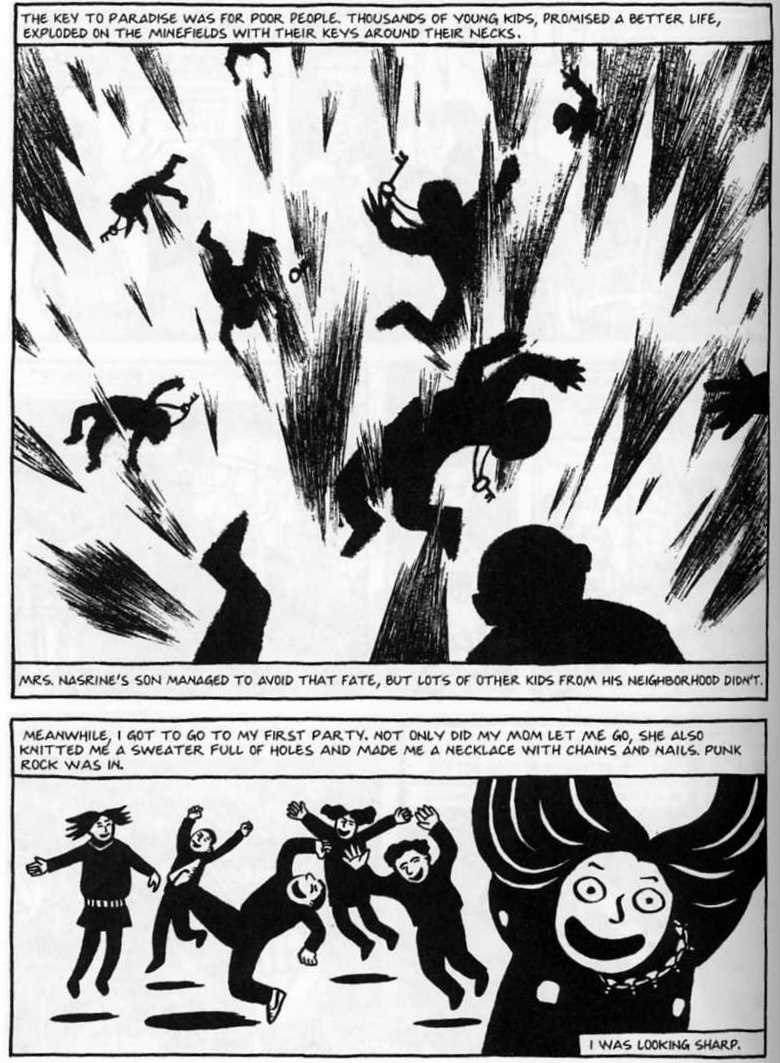
Chapter: The Key
During the past two weeks, we have been reading the graphic narrative Persepolis by Marjane Satrapi in my ASTU 100 class here at UBC. We have been discussing the first half of the narrative, and how memory is used to convey a message, as well how genre is used throughout the text. The narrative discusses the life of Marji, a ten-year-old girl from a middle-class family living in Iran during the Iranian Revolution, and the Iran-Iraq War. Throughout the text, we get to see the development of Marji’s opinions on religion, feminism, and social classes.
The chapter, The Key evoked many different emotions from me. On page 102 two frames are shown, one is bigger than the other, and both show the very different lives between children from different social classes. On the top frame,we see the children from a lower class, who come from poor families, whose lives may not show much promise. The boys of such families are presented with a key which is their entry to paradise. In paradise, they’ll find “food, women and houses made of gold” (pg.100) the place is described as being “better than Disneyland” (pg. 101). The frame shows the faceless children dying with keys around their necks. Below the upsetting picture is Marji enjoying her first party. She is seen with her friends having a good time, during one of many important moments in her life. The reason that one frame is drawn bigger than the other might have been because Satrapi believes that one holds greater importance.
The two very differing frames made me think of the topic regarding the differences in social classes, which then led me to think of how our views are heavily influenced by our parent’s. Children learn from their parents. They’re the ones from whom we learn to trust, and their way of thinking and acting make up our very cores. For example, I have been compared to my mother in many different aspects not just simply by the fact that I look like her, but because I act like her her too. Unlike my mother, I have been given the chance to live in a developed country which has also presented me with the chance to look at the world in a much broader view than my parents. Like Marji, I have been privileged to live a middle-class life, and like her, I have a middle-class perspective which I inherited from my parents. Although, I simply cannot relate to some of the aspects of Marji’s life. I have been fortunate enough to live in a society where freedom of expression, religion, and even mobility rights are a part of my everyday life and anything else would be foreign to me.
Throughout the book we see Marji’s parents, who are Marxists, fighting towards equality through a series of demonstrations. Which influence Marji’s thoughts regarding what’s right and wrong. It is a proven fact that parenting styles vary regarding the parent’s culture, social class, or even ethnicity. As Marxists they advocate for equality, Marji’s uncle Anoosh even claims that the “the proletariat shall rule” (pg. 62) I found some of the topics they preached about to be inconsistent with their actions. I disagreed with the way that the Satrapi’s maid, Mehri was treated. Mehri moved into the Satrapi’s home when she was eight years old. She came from a poor family, whose parents could not afford to feed and house her. What particularly moves me is the fact that she doesn’t eat with the Satrapi’s. Mehri’s not much older than Marji, and yet she eats alone, even though she lives with them. Mehri even falls in love with the Satrapi’s neighbour and keeps in contact with him through Marji’s help. Her social class prevents her from being with this boy, “because in [Iran] you must stay within your own social classes” (pg.37). In contrast, Marji’s social standings have been able to provide a different quality of life for her. While she’s been given the chance to live her life and have fun with her friends at parties, other children have to sacrifice themselves to religion on the impression that they’re finally going to live a better life.

Having gone through the revolution and the war with middle-class opportunities has rendered Marji’s experience different than other’s. This is not to say that her experience was any less meaningful or saddening. The scene where Marji’s beloved Uncle Anoosh is murdered under the false pretence that he is a Russian Spy is a prime example of how injustices can affect anyone. The death of her Uncle Taher is another example of how even money can’t fight the inequalities that everyone faces during the war. The fact that someone is in a different social class does not mean that they are immune to experiencing any problems in life.
Although Marji is a middle-class child whose views and experiences are different from Mehri’s and the children with the keys, she realizes the inequality between her life and theirs. She understands that the reason she feels guilty driving in her father’s Cadillac, and because they have a maid is because she’s aware that she has a better life. Accepting her privilege and acknowledging the fact that it exists is the first step towards fighting inequality. This is why Persepolis is such an important piece of literature because Satrapi has been able to use her education and privilege to educate others on her view of Iran, and she doesn’t just mention her experiences but, includes those who lead a different life. This book has given the world a chance to look at what life in Iran really looks like.
